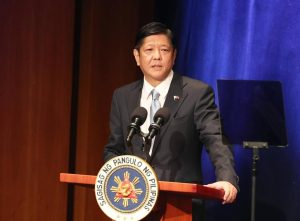U.S. President Joe Biden is slated to meet Philippine President Ferdinand Marcos Jr. at the White House on May 1. Looming over the meeting is the question of how the Philippines’ problematic human rights record will be addressed.
Since Marcos’ election last May, a key question has been whether his administration would reflect that of his father, the late Ferdinand Marcos Sr., whose autocratic rule from 1965 to 1986 was marked by brutality and corruption, or follow the record of Marcos Jr.’s predecessor, Rodrigo Duterte. Duterte cozied up to rights-abusing China, sought to crush or disregard the Philippines’ democratic institutions, and instigated the police to carry out thousands of killings of mostly urban poor people under the banner of a “war on drugs.”
These legacies cast a long shadow. So far, Marcos has shown little inclination to tackle persistent rights problems in the Philippines or pursue justice for past crimes.
In March, on the outskirts of Manila, I met the cast and crew of a theater company preparing a performance on the campus of Notre Dame of Greater Manila. The company, comprised of family members of victims of Duterte’s “drug war,” told me the production was a form of therapy for overcoming grief and acknowledging the loss of their loved ones.
During a rehearsal break, I met a woman actor who recounted tearfully how her husband was shot dead by the police in 2017: “When I looked, I saw all the gunshot wounds – in his head, in his neck,” she said. “…I couldn’t do anything except to scream. The children were crying. I said, let’s bring him home.”
She said the police planted drugs on her husband and claimed they shot him in self-defense, even though he didn’t own a gun. She was too scared to report the killing to the authorities.
“I want to tell the Philippine government to stop the violence,” she told me. “There are kids growing up now without their fathers.”
I also met Randy, the uncle of 17-year-old Kian delos Santos, whose death was one of only two cases of extrajudicial killings involving police – among thousands – that have been successfully prosecuted since 2016. The case was only successful because the police officers responsible were caught committing the murder on CCTV, generating widespread outrage.
Randy said that Duterte made the killings acceptable: “People got used to the violence. Nothing has really changed. Killings still occur. Is the Philippine government really investigating? How many more cases will happen like this?”
Human Rights Watch has interviewed dozens of family members of victims, and the absence of justice just adds to the families’ pain. Because of the lack of domestic accountability, the International Criminal Court is considering prosecuting as crimes against humanity the “drug war” killings, as well as earlier killings by Duterte’s so-called Davao Death Squad. from 2011 to 2016.
The killings didn’t stop when Duterte’s term ended. Since Marcos took office last July, police have allegedly carried out at least 262 drug-related killings, according to the Third World Studies Center of the University of the Philippines, which has been researching police abuses.
Courageous Filipinos who have spoken out against the killings have paid a heavy price – and continue to face consequences under Marcos. For instance, Nobel Peace Prize laureate Maria Ressa and her news organization Rappler, persecuted under Duterte, still face criminal libel and other charges as well as tax evasion investigations for their reporting on Duterte’s abuses.
Former justice secretary and senator Leila de Lima remains in police custody after more than six years on trumped-up charges because of her vocal opposition to the killings. When I visited her in detention in March, she remained determined to see justice done through the Philippine courts and clear her name. “I have to believe in justice,” she said.
Many other critics of the government have faced threats, harassment, and intimidation.
Biden should communicate clearly to Marcos that politically motivated charges against human rights defenders should be dropped. De Lima should be freed immediately. Those responsible for the “drug war” killings need to be held to account.
Biden should make clear that without genuine investigations and justice for past unlawful killings, his administration will consider targeted sanctions on those implicated. The U.S. Congress has already demonstrated a willingness to restrict security assistance to the Philippines on human rights grounds.
Marcos is no doubt eager for this visit to the White House to rehabilitate the family name – which remains synonymous with dictatorship, martial law, and boundless corruption. But if Marcos wants his family to be reconsidered, he needs to adopt real change in the Philippines. Biden should make sure he knows that.

































